Simplifying Life Insurance in India
12 Developmental Milestones of an 11 Month Old Baby
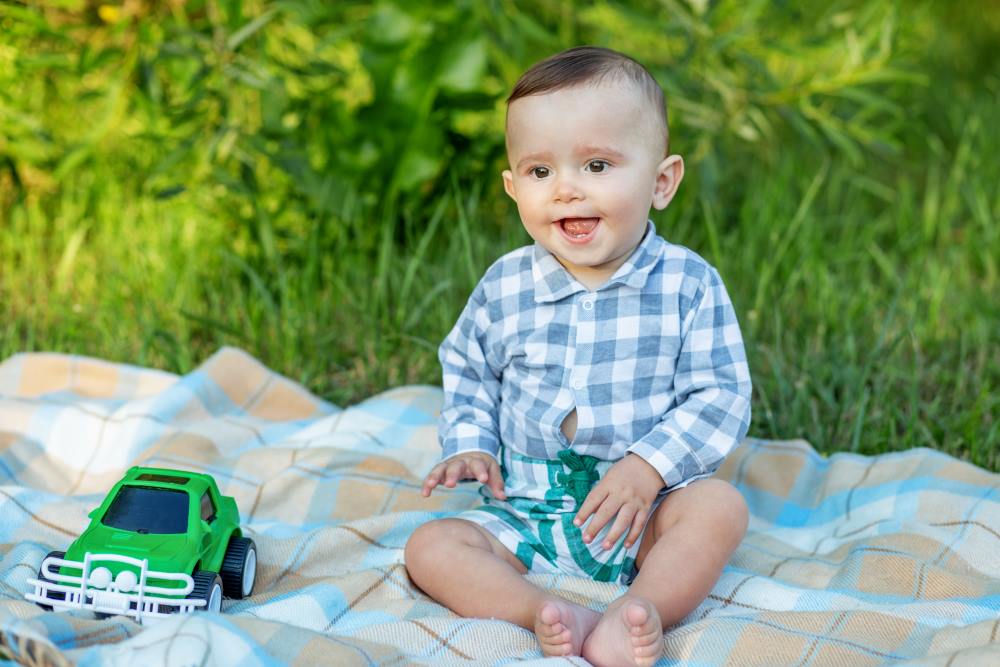
Your 11 month old is soon approaching their first birthday. This growing age is crucial to determine heath or growth concerns and rectify them. Understanding your baby’s needs is imperative for parents. Encouraging them to learn and grow is also a responsibility for them. Identify cognitive and physical needs to ensure the proper growth of your 11 month old.
Your baby has travelled a long way from the first newborn days, unable to lift their heads, to now, at 11 months. Your baby is almost a toddler with various capabilities and is reaching milestones. This article provides information for monitoring your 11 month old baby’s milestones and growth patterns.

Table of Contents

What Most Babies Do by 11 Months?
At 11 months, your baby strongly prefers people, foods, books, toys, and other items. Most babies at 11 months are also more mobile and start crawling, pulling themselves up to stand, and even taking steps. They are active in studying their surroundings. Most say simple words like "mama" or "dada"; they can grasp basic commands.
In addition, your baby can begin to seem to like one parent more than the other. Socially, they show preferences between these people and express joy or frustration. These babies like playing games interactively and even mimic adults when they do specific actions.
11 Month Milestones & Development Checklist
1. Movement Milestones for a 11 Month Old Baby
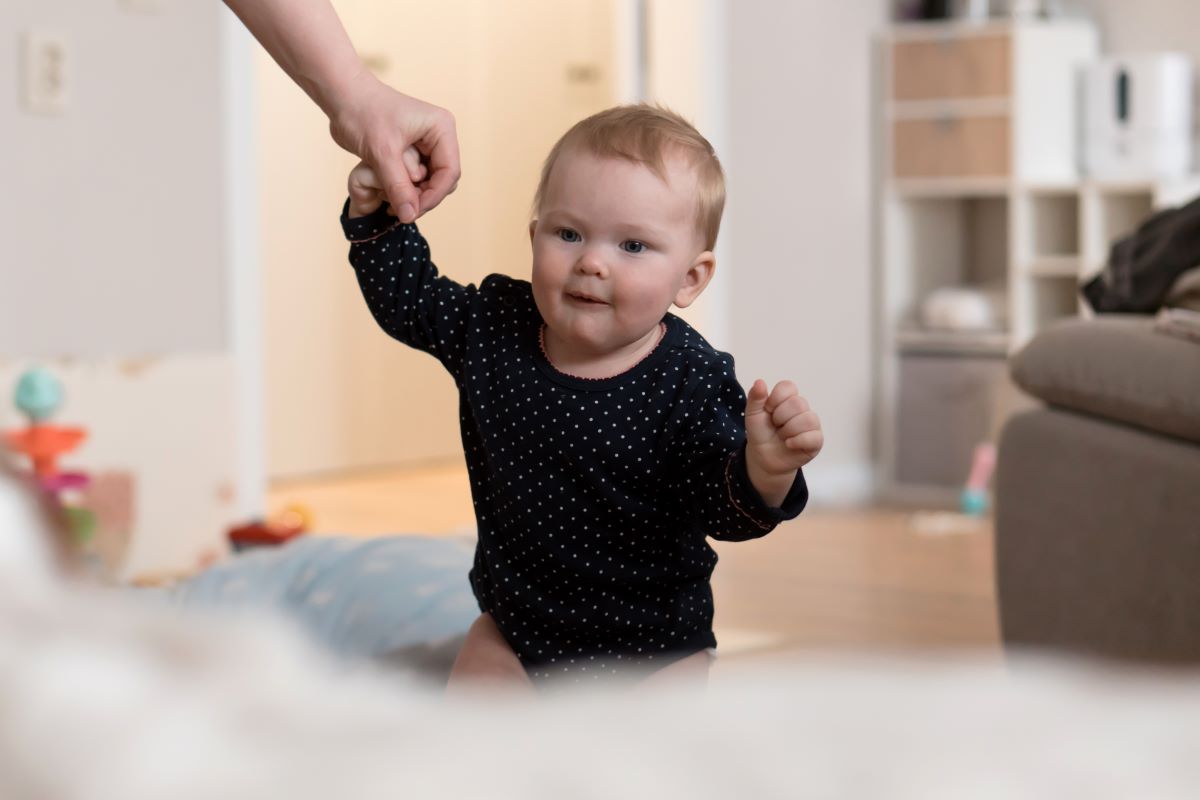
Movement Milestones for a 11 month old:
- Cruising: Cruising over the furniture, with sideways steps while holding onto it.
- Standing Up: Standing alone can be obtained for a couple of seconds
- Transitioning: Transition from sitting to standing and vice versa more effortlessly.
- Fine Motor Ability: Can grasp small objects and play with toys more finely.
All these milestones can be motivated through safe exploration spaces.
2. Visual and Hearing Milestones For a 11 Month Old Baby
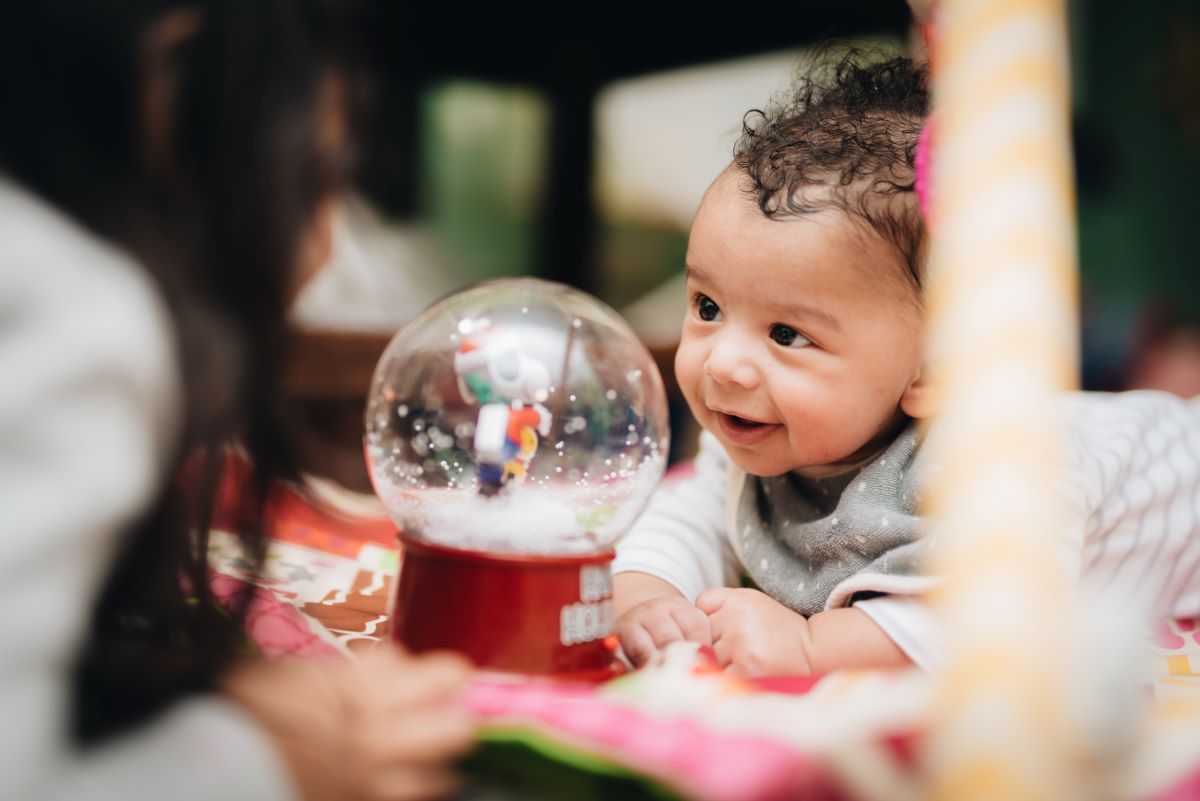
Visual Milestones:
At 11 months of age, babies make huge leaps in visual development, which increases their ability to understand and comprehend the environment.
- Depth Perception: The baby can determine objects' distances better and thus move around confidently.
- Tracking Objects: They can quickly move their eyes smoothly by tracking moving objects.
- Colour Discrimination: Begins to recognise different colours and shows a preference for specific colours.
- Hand-Eye Coordination: Coordination between hands and eyes to grab toys improves over time.
Hearing Milestones:
At 11 months, babies improve their ability to hear, express, and respond to sounds and things around them.
- Recognition of Name: Responds correctly and even turns around when a name is called.
- Responding to Sounds: Responds to known sounds, like voices, music, and toys and looks for them.
- Imitating Sounds: May imitate some sounds and gestures and show interest in communication
- Awareness of Rhythms: Shows ability to respond to sounds and music and move to the rhythm.
These steps represent their expanding recognition of their surroundings, thus forming part of their cognitive development.
3. Smell and Touch Milestones For a 11 Month Old Baby

Smell Milestones:
At 11 months, the baby can improve its sense of smell by discriminating between known smells and being sensitive to new smells in the environment.
- Perception of Familiar Odours: Infants can perceive familiar odours, such as the smell of their parents or favourite foods.
- Reaction to Novel Odours: Infants will be interested or even frightened by novel smells and demonstrate an awareness of sensory experience.
- Food Smells: Greater response to different food smells, showing like or dislike. This may be what they prefer.
Touch Milestones:
Babies enhance their touch sense by using their hands to explore and interact with different textures, which is important for overall development at this age.
- Exploratory Touching: The use of hands to touch objects, figuring out their shapes and textures so that they understand the surroundings better.
- Development of Fine Motor Skills: Able to grab, hold, and manipulate objects with more excellent dexterity with both or one hand.
- Sensitive to Textures: They like certain textures, either soft and smooth or rough and complex, which influences their play.
- Bilateral Coordination: Development of using both hands to function in an activity, such as clapping or playing with certain toys.
All these milestones present an expanded sensory experience critical for cognitive and physical development.
4. Sleep Milestones For a 11 Month Old Baby

Sleep Milestones for a 11 month old:
- Consolidated Sleep: Babies usually settle into sleeping all night, often all 11-12 hours, waking only a few times.
- Daytime Naps: Most babies take two naps daily, usually within one to two hours, in the morning and evening.
- Routine Sleep Schedule: Establish a stable bedtime routine so they can associate sleep time and experience a higher quality of sleep.
- Self-Soothing: Babies begin to self-soothe, which causes them to fall asleep for themselves if they wake up.
These are all signs of well-being and play a significant role in their actual growth in health and mind.
5. Health Milestones For a 11 Month Old Baby
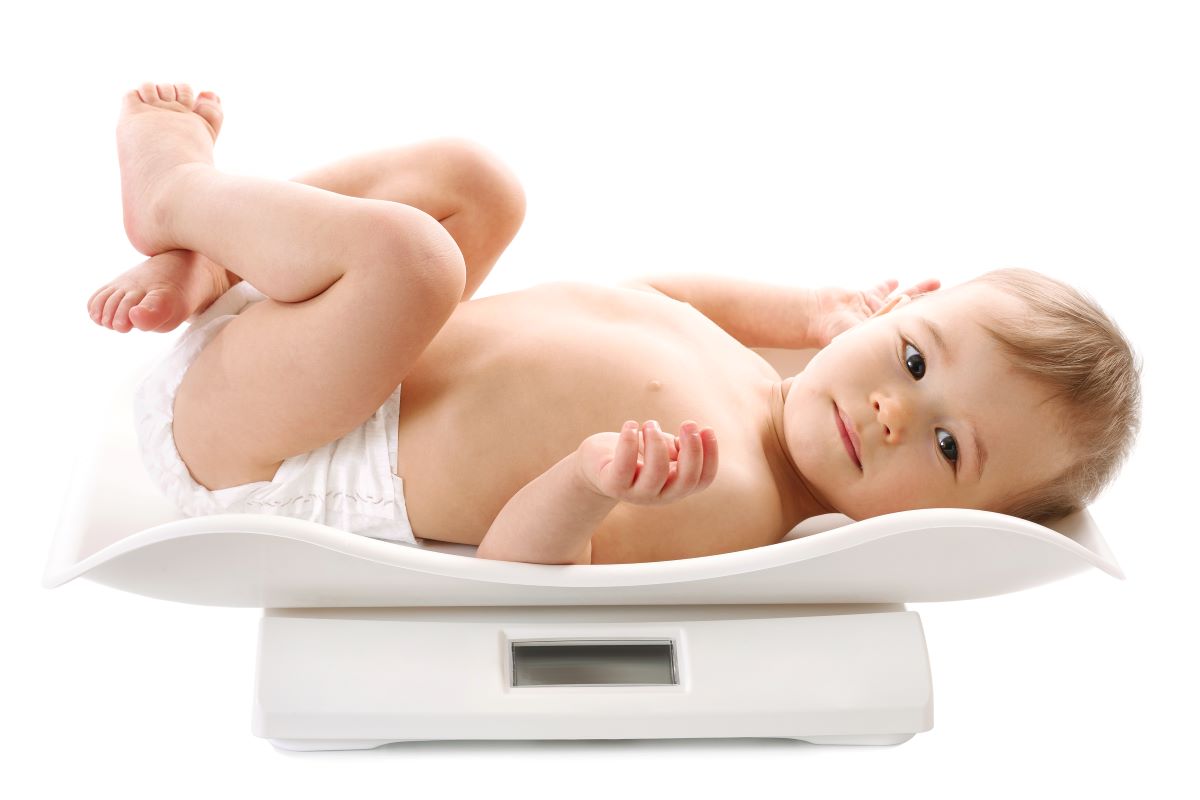
Here’s a chart summarising the ideal parameters for a 11 month old baby:
These parameters can help monitor your baby's growth and ensure they develop within a healthy range. Regular check-ups with a paediatrician can provide further insights into your child's growth patterns.
6. Feeding Milestones for a 11 Month Old Baby
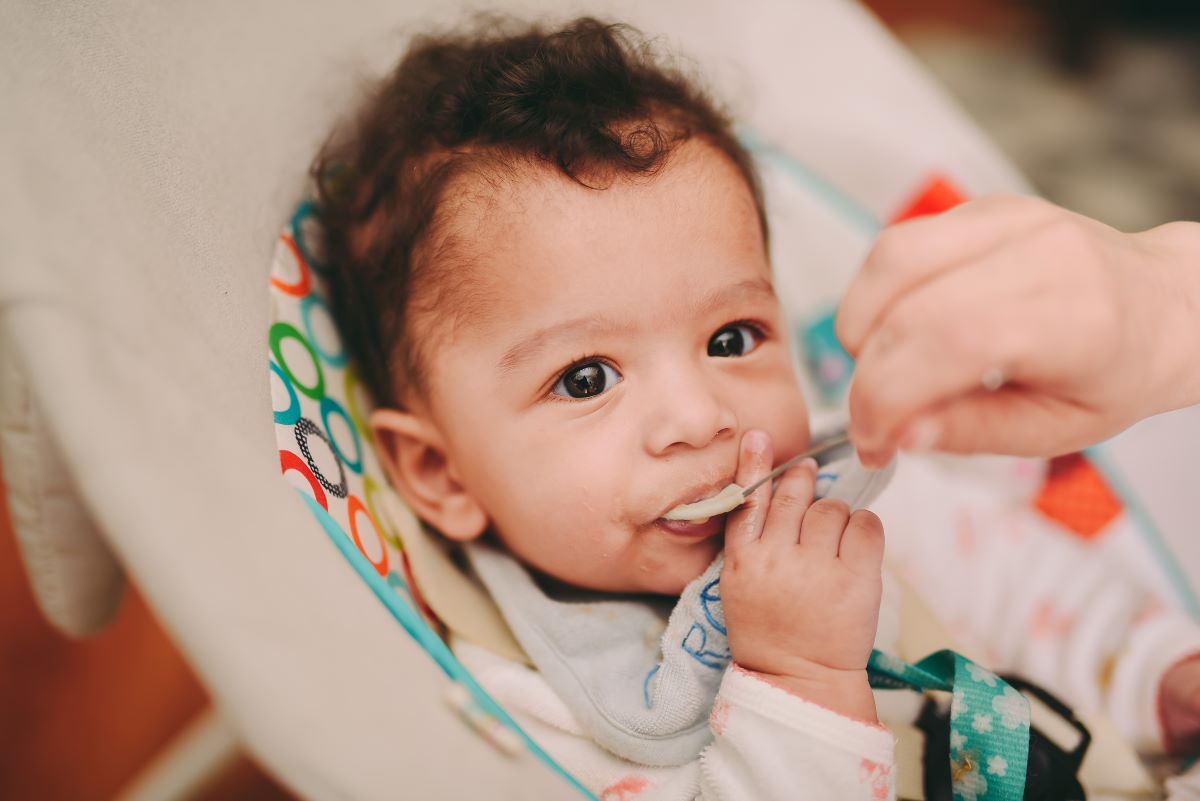
Feeding Milestones for a 11 month old:
- Self-Feeding: Most babies start feeding themselves with their hands or with spoons. Self-feeding activities develop these babies' fine motor skills.
- Diverse Diet: They can easily have more diet items than previously, like soft fruits, vegetables, and small meat pieces, which reflects their growing palates.
- Chewing Skills: Improved chewing skills allow them to adopt a diet with more textured foods and discontinue purees.
- Drinking from a Cup: Most children continue weaning from bottles into sippy or full cups and can drink independently.
- Displaying Preferences: They will start to have food preferences indicating that their taste and appetite are coming forward.
These skills are still contributing to healthy development, especially as they near one year of age.
What to Feed:
At this stage, consider the following foods to support their growth and development:
Providing a balanced and varied diet helps foster healthy eating habits and support your baby's nutritional needs.
7. Schedule and Routine Milestones For a 11 Month Old Baby
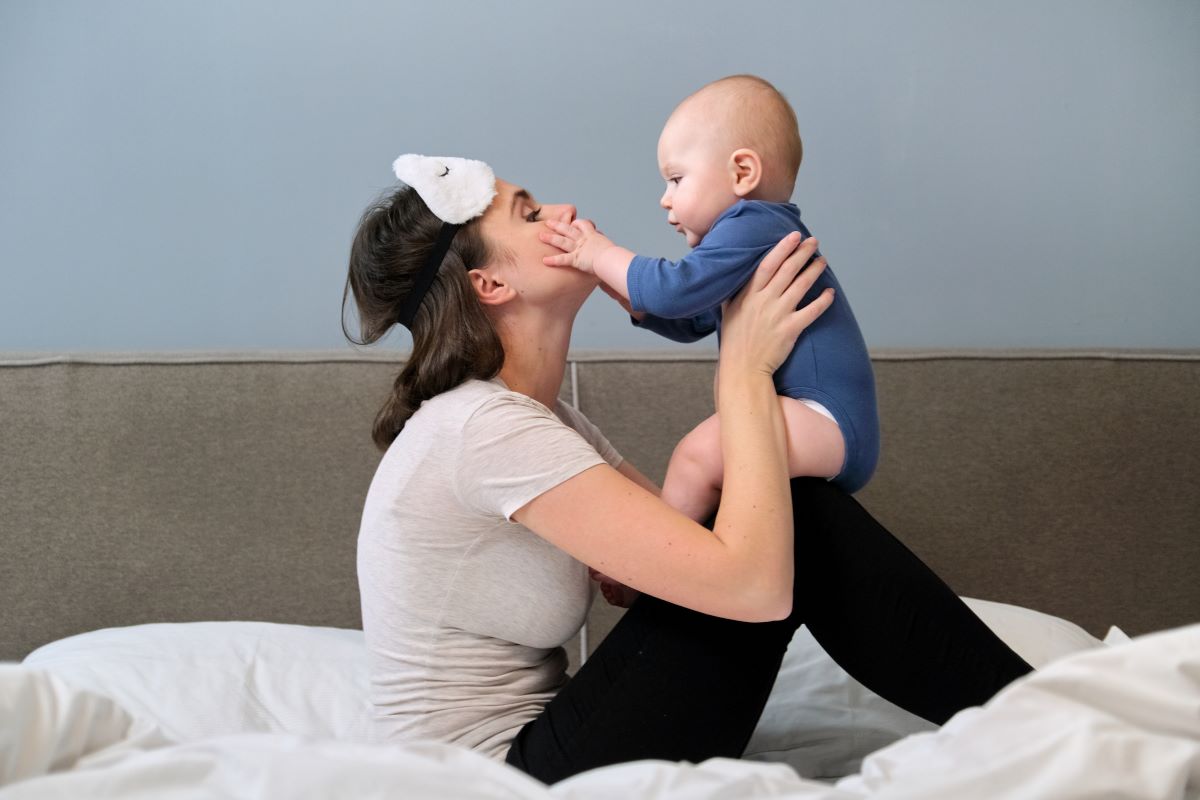
Daily Schedule for an 11 month old Baby:
This schedule provides a structured routine that supports the developmental needs of an 11 month old while allowing for flexibility based on individual preferences and needs.
8. Cognitive Milestones for a 11 Month Old Baby
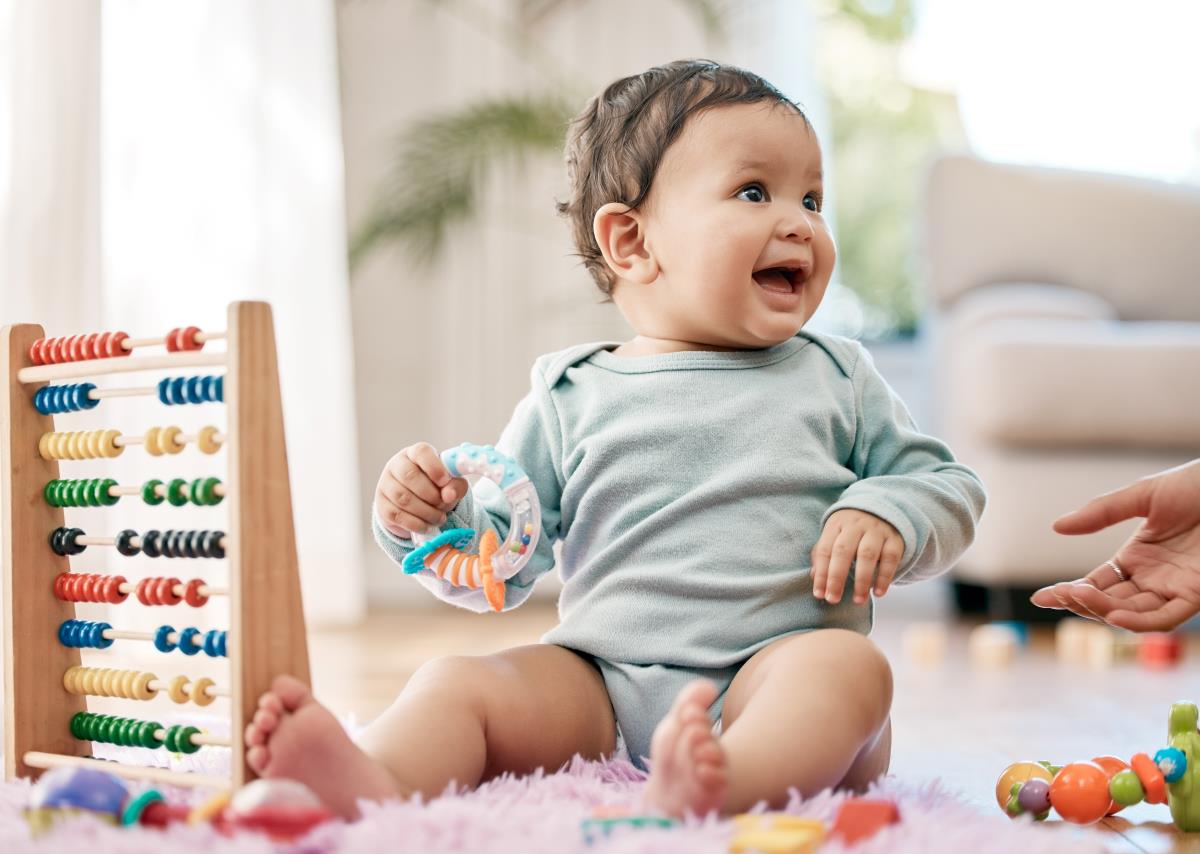
Here are key cognitive milestones for a 11 month old:
- Object Permanence: This means that babies start to realise that objects exist even when they are out of view, much like during a peek-a-boo game.
- Problem-solving Skills: They display an improved ability to solve simple problems, such as figuring out how to reach a toy that is only slightly out of their reach.
- Imitation: Babies tend to imitate everything they see others do, so here's evidence of how learning through observation happens.
- Understanding of Names and Labels: Most can recognise and respond to known objects, and even people, by name- this is a tool for their language development.
- Understanding Cause-and-Effect: Babies may start to learn simple cause-and-effect relationships, like they know hitting one button lights up a toy.
These cognitive developments are significant because they prepare children to master even more complex learning in the succeeding months.
9. Social and Emotional Milestones For a 11 Month Old Baby
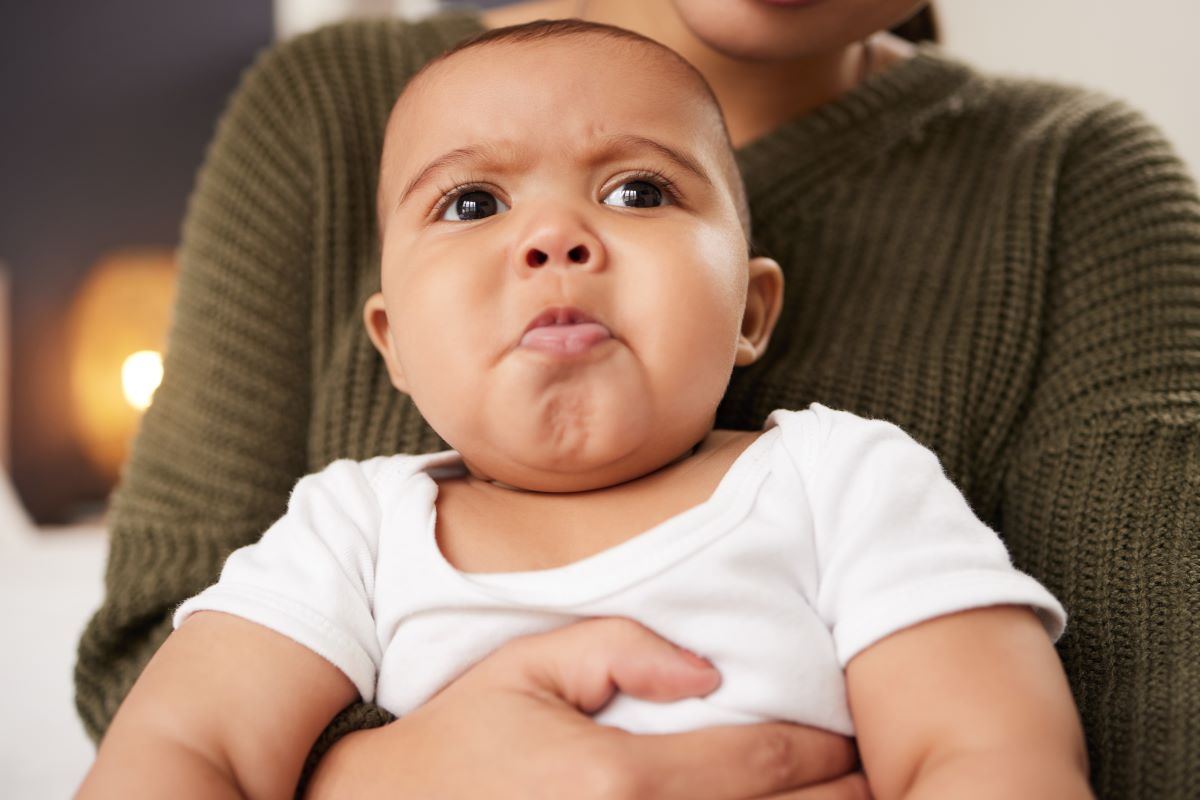
Here are key social milestones for a 11 month old:
- Stranger Anxiety: Most babies become fearful or anxious about strange individuals, indicating attachment to the caregivers.
- Social Referencing: Babies start to look back at their caregivers for guidance on acting when new events arise, illustrating trust and a need for reassurance.
- Emotions: They can produce more varied and intense emotions, such as happiness, irritation, and affection, portrayed through facial expressions.
- Attachment Behaviors: The attachment towards the primary caregivers is more pronounced as the babies mostly seek solace in them and do not like staying away.
- Parallel Play: They don't play with other children, but they can be seen playing parallel to other children and are interested in the plays surrounding them.
These 'landmark' events reflect their growth in social skills and increasing emotional knowledge, which will later form the basis for other relationships.
10. Language and Speech Milestones For a 11 Month Old Baby
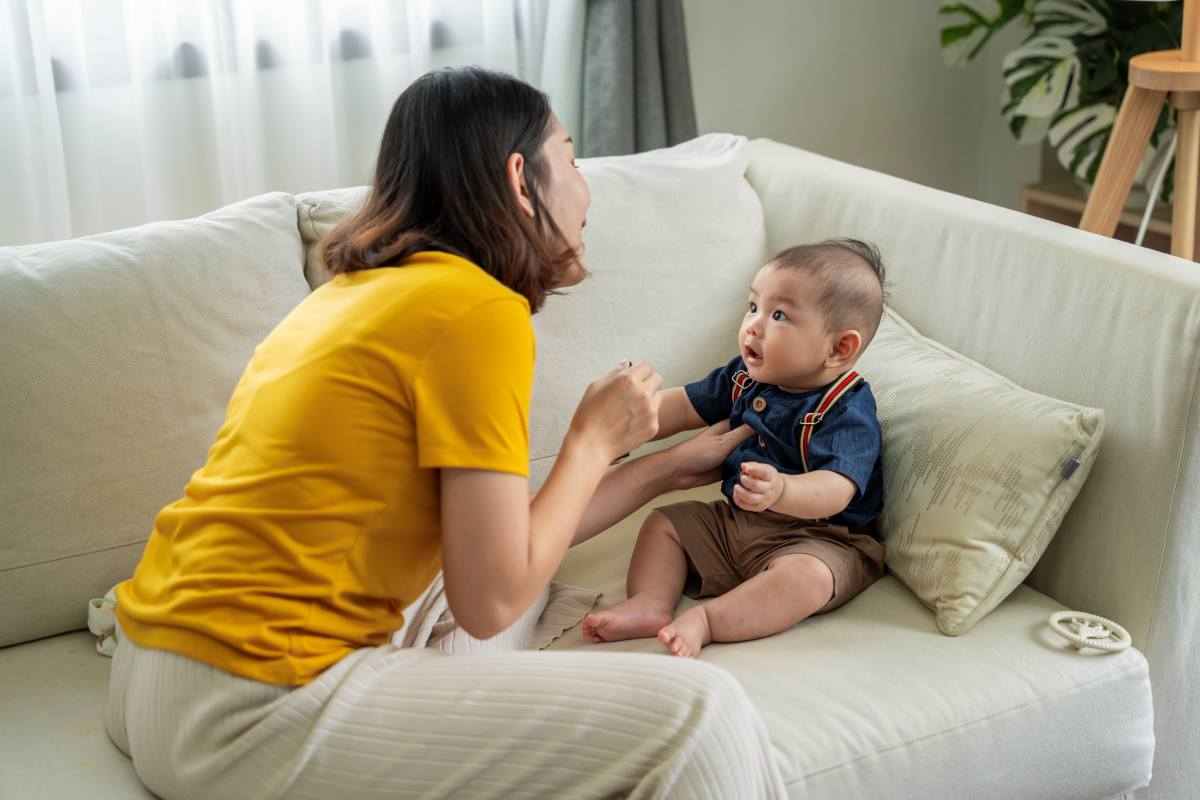
Language and Speech Milestones Development for a 11 month old:
- Babbling: Infants test to take their babbling to the next level by combining sounds and testing intonation, eventually leading them toward speech.
- First Words: They say their first recognisable words, "mama" or "dada." They tend to say these with purpose.
- Responding to Simple Commands: By this time, infants begin responding to simple requests, such as "Come here," and show an understanding of words.
- Use of Gestures: They use gestures, such as pointing or waving, to convey their needs and interests and improve their nonverbal communication.
- Imitation of Sounds: Many children start imitating the sounds and speech patterns they hear from adults, which encourages more language development.
The following are some of the significant milestones in the process. They describe an increase in their ability to express and comprehend, which then gradually develops into more complex speech.
11. Play Milestones For a 11 Month Old Baby
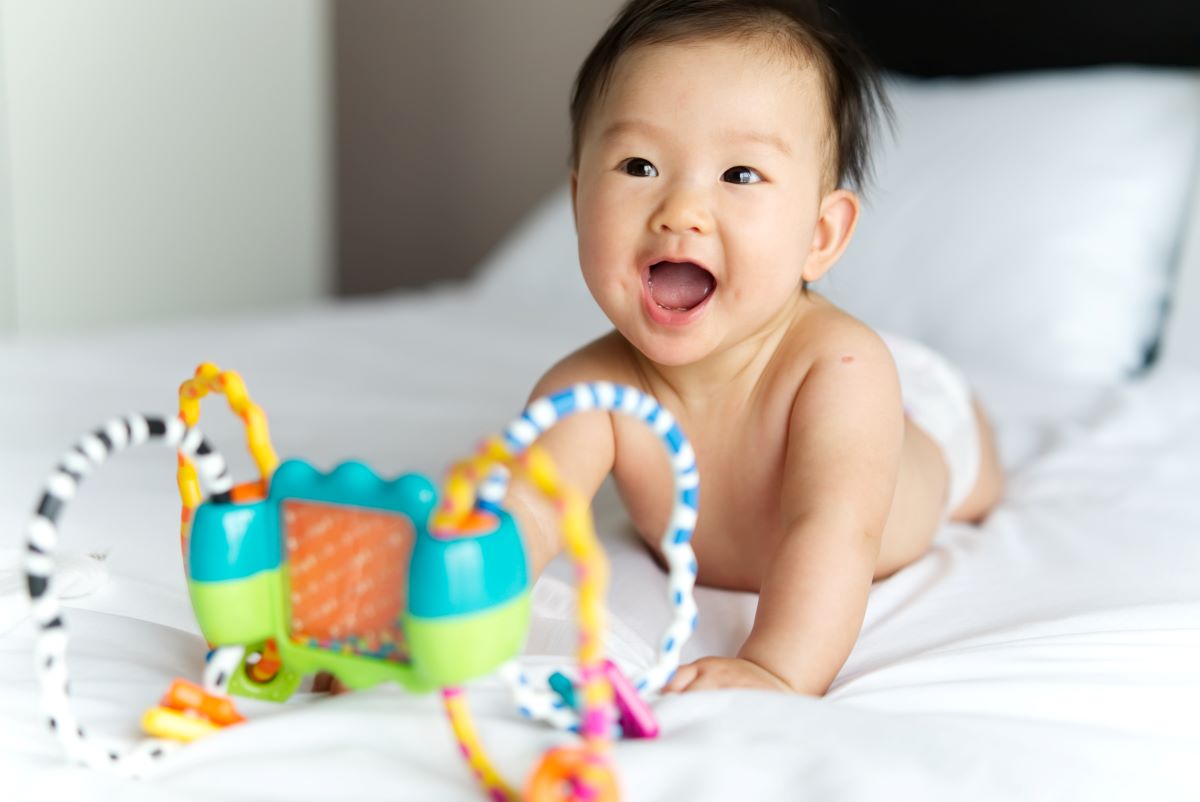
Play Milestones for a 11 month old:
- Exploratory Play: Infants become much more active explorers of the environment. During this stage, they use their senses to discover new objects and textures.
- Functional Play: At this point in life, babies begin to use toys purposefully, for example, to stack blocks or to move cars to demonstrate how things work.
- Imitative Play: Most babies imitate what they have seen adults do, like making sounds as if they are on the phone or feeding a doll.
- Interactive Play: They enjoy playing simple interactive games, such as peek-a-boo or pat-a-cake, which encourage social interaction and bonding.
- Parallel Play: While playing alongside other children, they only learn to play cooperatively, evidencing an interest in peers and their activities.
These milestones show how important play is for developing growth across the various domains of development.
12. Physical and Motor Milestones For a 11 Month Old Baby
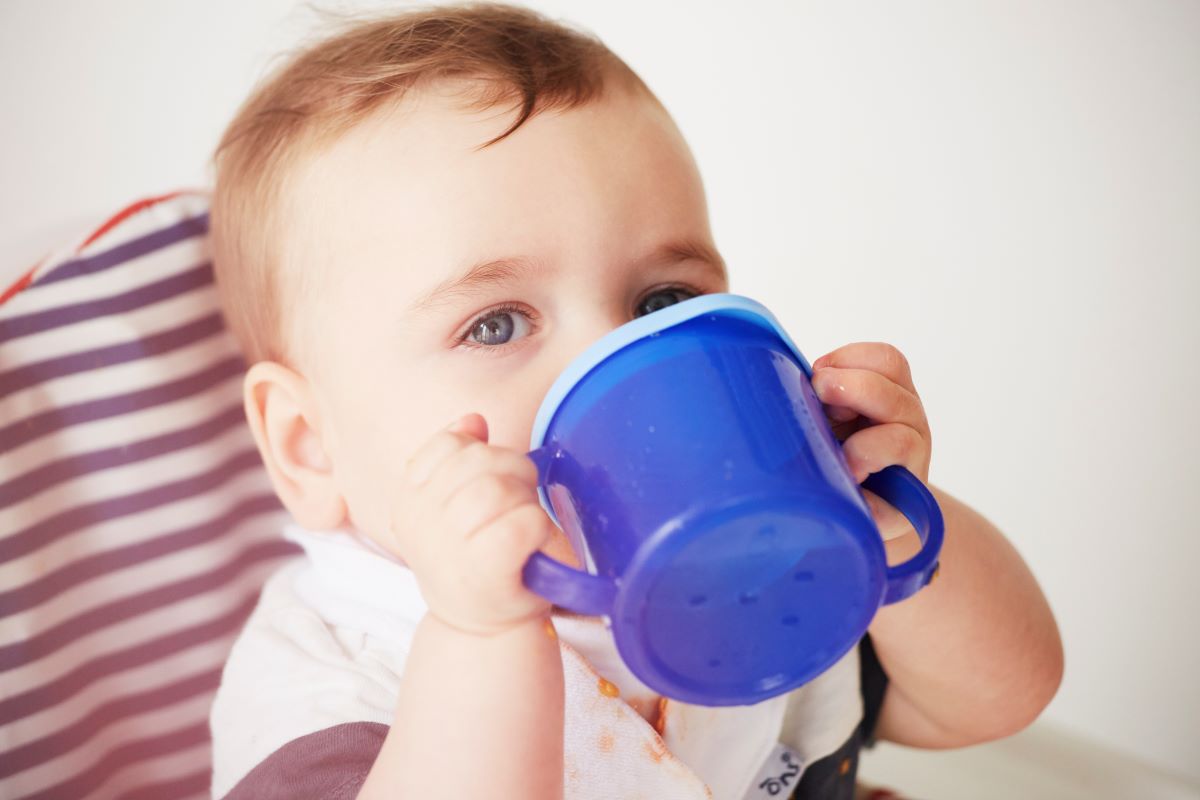
Physical and Motor Milestones for a 11 month old:
By 11 months, the baby has progressed tremendously in physical and motor development as an indication of their growing strength and coordination.
- Crawling: Crawling is mostly on hands and knees, but some kids may crawl on all fours or resort to other practices, such as scooting.
- Pulling up to a stand: They can pull up to a standing position by holding onto furniture or similar supports, which shows improvement in leg strength.
- Cruising: With the support of furniture, sideways steps may begin while holding onto the body for balance. This is a form of preparation for independent walking.
- Independent Standing: In this stage, they can stand alone without support for at least a couple of seconds to prove that they are doing well in walking.
- Mastering Fine Motor Coordination: Better dexterity helps them hold tiny objects, pick up food, and play with toys much better.
What are the Developmental Activities for a 11 Month Old?
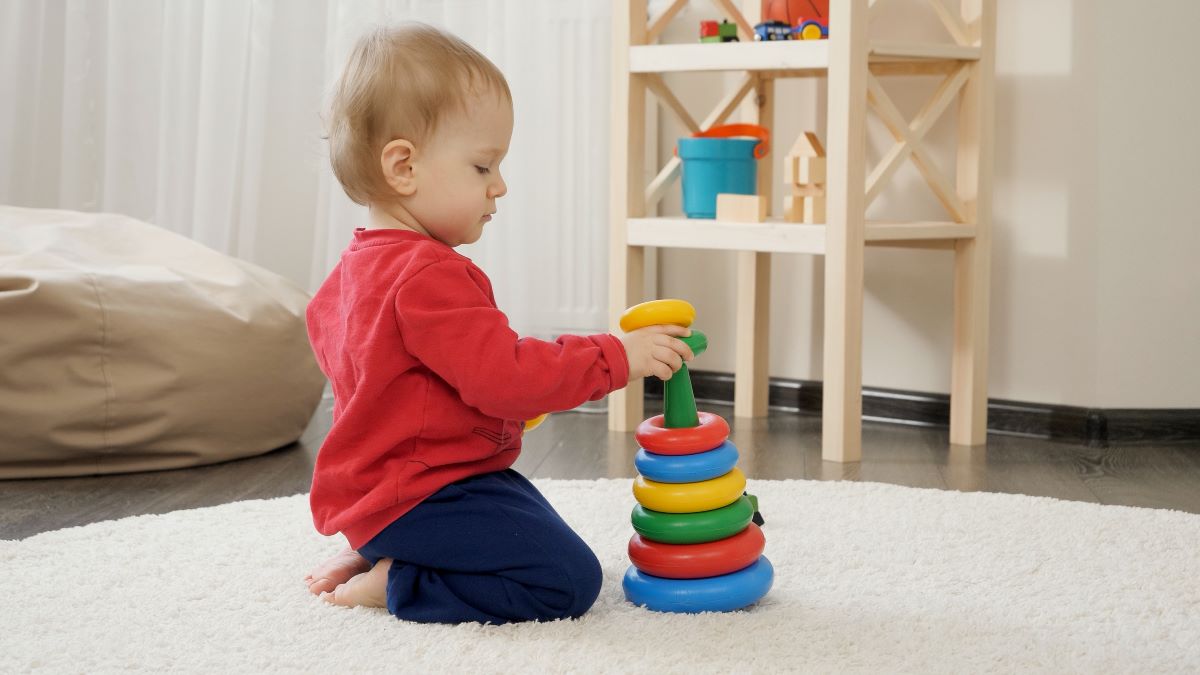
1. Sensory Play
Sensory play can be conducted in a sensory bin with safe materials like rice, pasta, or water beads. Allow your baby to dig and explore different textures and sensations, promoting curiosity and cognitive development.2. Stacking Blocks
Colourful stacking blocks are available for your baby to play with. On one side, they enhance fine motor skills, but on the other, they introduce concepts about balance and gravity, encouraging critical thinking.3. Interactive Storytime
Read books with lots of pictures and interesting textures. Allow your baby to touch and engage with the pages to foster early literacy skills and affection for reading, creating a bonding experience through storytelling.4. Instrument Play
Give your little one simple musical instruments such as maracas or tambourines. Let him shake and bang them to listen to sounds, develop rhythm, and express creativity, nurturing a love for music and sound exploration.5. Crawling Obstacle Course
Arrange a soft obstacle course with pillows, blankets, and toys around a room. Stumbling and falling are critical factors in gross motor testing, and this activity will help your baby build confidence and coordination as it navigates the space.6. Push and Pull Toys
You can give your baby push/pull toys so that they learn how to balance and coordinate themselves when learning to stand and walk. This enhances their confidence in movement and makes them feel more secure as they explore their environment.7. Water Play
Sometimes, engage your baby in water play in a shallow basin or tub. Use cups and toys to pour and splash, explore sensory input, and develop skills for fine motor movements while enjoying water's calming effects.8. Finger Paints or Crayons Art
Allow your baby to indulge in messy playtime, using non-toxic paints or large crayons to explore colours and textures while articulating her thoughts and feelings about them, enhancing self-expression.9. Basic Puzzles
Prepare simple, oversized, chunky puzzles that are easily handled. It will help the baby solve problems, exercise hand coordination, and train with patience and perseverance, laying the groundwork for more complex problem-solving skills.10. Imitation Play
Engage your baby in imitation games, such as clapping, waving, or dancing. This will also develop social skills and an understanding of your and your baby's actions, fostering communication and emotional connection.11. Treasure Hunt
Hide objects with different colours in a room where your baby needs to look for them. Encourage exploration and build the baby's problem-solving skills to find treasures, igniting a sense of adventure and discovery.12. Ball Play
Roll back and forth with your baby using soft balls. This activity will help him develop his gross motor skills in terms of the large muscle groups of the body, such as arms and legs, while promoting social interaction and fun.Safety Tips for a 11 Month Old Baby
A time when your baby becomes inquisitive towards everything around you and can move about freely is a time when you should always ensure his safety. Some of the significant tips for securing a haven for your little one are discussed below:
These safety measures will allow your 11 month old to discover and grow in safety.
Savings & Protection Options for Your Child
How to Support a Baby's Development at 11 Months?
1. Encourage Communication
Talk to your baby often, using adult speech, and respond to their sounds. This helps them learn to imitate words and builds communication skills. Describe your baby’s emotions and your own to help them connect words with feelings, such as saying "happy" or "tired."2. Read Together
Read books with your baby, and make it more interesting by adding facial expressions, sounds, and voices. Babies at this age like books with textures, flaps, or activities. While reading, point to the objects in the pictures and name them aloud.3. Encourage Movement
Help your baby pull themselves up to stand and practice walking. You can also encourage them to push things around, like empty boxes, a "kiddie chair," or "push toys". Set up soft obstacles like cushions for baby to climb over or crawl under, enhancing their motor skills.4. Make Sure They're Safe
Create a safe environment for your baby to explore by removing anything that could be a choking hazard or breaking into small pieces. Always watch your baby while they explore new areas to prevent falls or accidents.5. Make Mealtime Fun
Let your baby practice feeding themselves with their fingers and a cup. Sit next to them and enjoy mealtime together. Introduce a variety of textures and flavours to make meals exciting and offer your baby choices to develop preferences and interest in food.6. Get Enough Sleep
Babies at this age need 9 to 12 hours of sleep each night, plus two daily naps. A consistent bedtime routine can help. Ensure your baby’s sleep environment is dark, quiet, and cool, with minimal distractions to promote restful sleep.When to Talk to the Paediatrician?
Delayed Milestones:
If your baby is not attaining developmental milestones, like sitting, crawling, or walking, consult your paediatrician.Language Problems:
Language development problems can strongly affect your child's ability to communicate later. Therefore, an early evaluation is significant.Social Interaction Issue:
If your baby does not interact much, avoids eye contact, and does not smile when interacting with others.Protracted Crying:
If the baby keeps crying and seems challenging to soothe, it might not be normal. By understanding the reason, you'll know how to soothe your baby.Changes in Behavior:
If the change of behaviour is immediate, such as your baby becoming irritable or withdrawn abruptly, it should be dealt with.Feeding Issues:
Your baby is not feeding and drinking regularly and is losing weight. If addressed early, feeding problems may be prevented.Sleep Problems:
Frequently, a sleeping baby suffers from sleep problems or a noticeable change in the sleep pattern that indicates a need to talk.Vaccination Questions:
Discuss questions about vaccinations and their schedules. Knowing the importance of vaccinations will help you make pertinent decisions.FAQs about 11 Month Developmental Milestones
What are the major physical milestones at 11 months?
How do I get my 11 month old baby to walk?
What fine motor skills should my 11 month old be developing?
What are the cognitive skills of most children at 11 months?
What are some social developments for a baby in 11 months?
Which language skills should I encourage for my 11 month old baby?
How can I stimulate my 11 month old baby's language skills?
Is separation anxiety for babies common at 11 months?
How many hours does an 11 month old baby sleep?
My 11 month old baby is not doing what I want. What should I do?
How can I support my 11 month old baby's sensory development?
Is my 11 month old child supposed to throw a tantrum?
What are the appropriate toys for my 11 month old baby?
How should my 11 month old baby's diet change?
What should I be extra careful about for the safety of my 11 month old baby?
How can I get my 11 month old baby to care about other humans?
Is it usual for my 11 month old baby to be fussy about food?
How do I encourage my 11 month old baby's problem-solving skills?
What do I look for as signs that my 11 month old baby wants more independence?
When should I worry about my 11 month old baby's development?
Important Articles about Infant Developmental Milestones




















